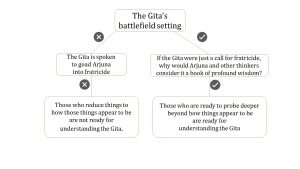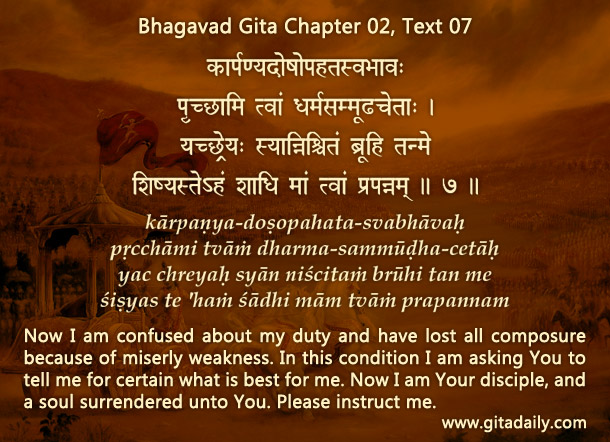
The Bhagavad-gita’s setting can seem provocative. A warrior, Arjuna, has second thoughts about fighting a fratricidal war. Arjuna seems so considerate, even compassionate. In disturbing contrast, the Gita seems to be spoken to incite Arjuna into fight.
But is that what is actually happening? To evaluate, let’s consider both the Gita’s first student Arjuna and its later illustrious readers.
The Gita’s first student: If the only ethical issue involved was whether to fight a fratricidal war or not, a person as thoughtful as Arjuna wouldn’t have merely hesitated; he would have outright refused to fight. Instead, he earnestly sought guidance about the right thing to do (Bhagavad-gita 02.07) — his fervent inquiry itself suggests strongly that the issues at stake were far more complex. And their ethical complexity becomes evident if we read the Mahabharata, the larger epic of which the Gita is a vital part.
The Gita’s later illustrious readers: If a book had been written just to goad a thoughtful warrior into a fratricide, that book would be considered not ok by most sensible people. Yet the Gita has been considered not just ok, but profound, by millions for millennia. And those millions have included many of the greatest Eastern philosophers — and many eminent Western thinkers in modern times.
The Gita’s setting forcefully thrusts a choice upon us: will we reject things (in this case, the Gita itself) based on face value or will we be ready to probe deeper? The Gita probes deep into the nature of reality — and it tests its readers by providing them a setting that can be understood only if they are ready for serious contemplation, not summary condemnation. And this is a principle that can help us in all areas of life: don’t reject things based on how they look; look beyond appearance to substance.
One-sentence summary:
To understand things properly, resist the temptation to reject things based on how they appear to be — that is a principle conveyed by the Gita’s provocative battlefield setting.
Think it over:
- Why may the Gita’s setting seem provocative?
- In what two ways can we know that the ethics of the Gita’s setting is not as simple as it seems?
- How does the Gita’s setting test the readers’ readiness to understand the Gita?
***
02.07: Now I am confused about my duty and have lost all composure because of miserly weakness. In this condition I am asking You to tell me for certain what is best for me. Now I am Your disciple, and a soul surrendered unto You. Please instruct me.
To know more about this verse, please click on the image


Stoic mine bears imperceptible advantages